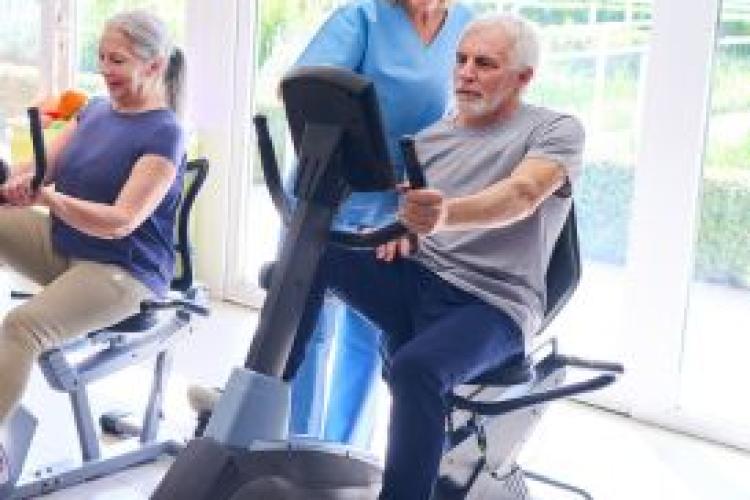
Some people who have problems with heartburn, bloating and pain in the upper abdomen after eating may be suffering from a condition known as delayed gastric emptying, or gastroparesis. This is a disorder that slows or stops the movement of food from your stomach to your small intestine. The condition is most commonly seen in people who have had poorly controlled diabetes for many years. Recently, a growing number of cases have been seen in people taking the popular weight-loss medications known as GLP1 agonists such as Ozempic, Mounjaro and Wegovy, says Yaron Langman, M.D., a gastroenterologist with Digestive Disease Associates of Rockland.
Normally, after you swallow food, the muscles in the wall of your stomach grind the food into smaller pieces and push them into your small intestine to continue digestion. When you have gastroparesis, your stomach muscles work poorly or not at all. This means your stomach takes too long to empty its contents.
Gastroparesis can be caused by:
- Diabetes. Diabetes can cause gastroparesis by damaging nerves in the wall of the stomach. This causes the muscles of the stomach and small intestine to not work normally. Movement of the foods through the digestive tract is slowed or stopped, and the stomach does not empty.
- Long-term narcotic medication use. Gastroparesis can also occur in people taking long-term narcotic medications such as codeine, hydrocodone, morphine or oxycodone. The condition is reversible if the patient stops taking the medication.
- Viruses. “We also see younger patients who have developed gastroparesis after having some sort of virus,” Dr. Langman said.
- GLP1 agonist medication. These weight-loss drugs can delay or decrease the contraction of muscles that mix and propel contents in the gastrointestinal tract, Dr. Langman explained. This leads to delayed stomach emptying.
If gastroparesis is not treated, it can lead to malnutrition due to poor absorption of nutrients.
Symptoms of gastroparesis may include:
- Indigestion
- Acid reflux and heartburn
- Bloated stomach
- Feeling full very quickly and/or for a long time
- Upper abdominal pain
- Nausea and vomiting
- Regurgitating (spitting up) whole pieces of undigested food
- Loss of appetite
Diagnosing Gastroparesis
Patients and doctors often assume the symptoms of gastroparesis are reflux or other gastrointestinal conditions. This means it may take a long time for someone to be diagnosed correctly, Dr. Langman said. Diagnosis may include tests to measure stomach emptying. In one test, called a gastric emptying scan, the patient eats a bland meal such as eggs or oatmeal, which contains a small amount of radioactive material. A camera outside the body scans the abdomen to show where the radioactive material is located. By tracking the material, the doctor can measure how fast your stomach empties after a meal.
Treatment
Gastroparesis often can be treated with diet and lifestyle changes. These include having smaller, more frequent meals (four to five daily), and not eating four to five hours before bedtime.
Because certain type of non-digestive fibers and fat can slow gastric emptying, people with gastroparesis should eat a low-fat, low-fiber diet.
There are medications available to treat the condition, but Dr. Langman says they are generally prescribed only if diet and lifestyle measures don’t work.
One treatment option for severe cases is to inject botulinum toxin (Botox) into the pyloric sphincter, a band of smooth muscle in the stomach. The injection paralyzes the muscle. This can help the stomach empty better.
People taking GLP1 agonists tend to eat less, so symptoms may improve over time, Dr. Langman says. Some patients are so uncomfortable because of their gastroparesis that they decide to stop taking the medication.
For people with diabetes, keeping glucose levels under control can help prevent or delay nerve damage that can cause gastroparesis. Meal planning, physical activity and medicines, if needed, can help keep glucose levels within your target range.
If You’re Having Surgery or Colonoscopy
If you are going to be having surgery or a colonoscopy, it’s important to tell your doctor if you have gastroparesis or if you’re taking a GLP1 agonist medication, Dr. Langman says. That’s because the doctor needs to know that your stomach may take longer than usual to empty its contents. “Your food could still be in your stomach after many hours, and this can pose a danger if you are going to be having anesthesia. You need an empty stomach to prevent nausea and to keep any food or liquid from getting into the lungs.” For endoscopy or colonoscopy, you need an empty stomach in order for the doctor to be able to clearly see your bowel.
“If your stomach is slow to empty, the doctor may want to put you on a special diet for a longer period or make other changes to your prep before a surgical procedure or colonoscopy,” Dr. Langman said.



 Upcoming Events
Upcoming Events



